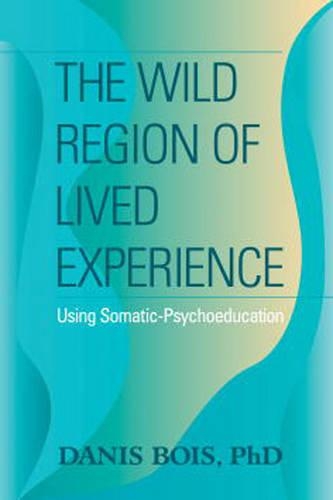
The Wild Region of Lived Experience: Using Somatic-Psychoeducation
(Paperback)
Publishing Details
The Wild Region of Lived Experience: Using Somatic-Psychoeducation
By (Author) Danis Bois
North Atlantic Books,U.S.
North Atlantic Books,U.S.
15th July 2011
United States
Classifications
Professional and Scholarly
Non Fiction
616.0019
Physical Properties
Paperback
216
Width 153mm, Height 229mm, Spine 16mm
336g
Description
"The Wild Region of Lived Experience" introduces the emerging discipline of somatic-psychoeducation, a body-mind approach developed over a period of twenty-five years by author Danis Bois. The book describes somatic-psychoeducation as an approach that uses aspects of manual therapy (touch), movement, and psychotherapeutic methods to help people heal from physical and emotional issues, as well as develop their maximum potential for balance, well-being, and creativity. The method considers the person as a body-mind unit, bringing a resolution to physical pain and psychological suffering, thereby helping one regain the sense of their life.By teaching people to perceive, to feel, and to reflect, they learn from their bodies and from events in their lives. Parts I and II of the book provide a general description of somatic-psychoeducation, as seen through the career path and personal experience of the author. In Part III, the author introduces the idea of 'body-mind tuning', which involves methods of touch, movement, and introspection, and verbal dialogue to connect the patient more fully to his or her body, thoughts, and behaviour. Part IV explores the origin and evolution of physical and psychological pain and explains how somatic-psychoeducation helps people heal.
Reviews
I've never seen such a powerful and complete method for transformation. Danis Bois encompasses body and soul in a way yet unknown in North America. When you read Danis Bois's book, you know that you're entering a new region of your lived experience. This book is about you.
Pierre Paill, PhD
Although somewhat skeptical about alternative treatments, in general, I have had personal experience with this method and have found it to be quite powerful. It is very effective in fostering the development of inner awareness and has great therapeutic potential in this regard. Demonstrating the validity of alternative therapies presents a difficult challenge with respect to creating an appropriate experimental design. Danis Bois and his colleagues are to be commended for their efforts in exploring a scientific understanding of this phenomenon through their work at the Modern University of Lisbon.
Neil Sonenklar, MD
Author Bio
Danis Bois was born in France in 1949. Trained as a physical therapist and osteopath, he was head of the re-education centre of Vend me's hospital (France) for four years. In 1983, he founded a school of fasciatherapy, a manual therapy originally inspired by his experience of osteopathy. In the following years, this therapy spread across several countries in Europe and North America, including France, Belgium, Switzerland, Greece, Portugal, Germany, and Canada. This work has just recently been introduced in the US and in Brazil. In 2000 he completed a university diploma in Developpement Cognitif et Social du Nourrisson (Cognitive and Social Development of the Newborn) at the Universite Paris V, and then a Licenciatura de Psicopedagogia Curativa (Masters in Curative Psychoeducation) at the Modern University in Lisbon. In 2003, he became Visiting Professor at the Modern University in Lisbon, where he created a post-graduate program in somatic-psychoeducation and a Master's Degree program in perceptual psychoeducation. He was appointed Director of the Centre for Applied Research and Study in Perceptual Psychoeducation (CERAP) at the Modern University in 2004. In November 2005, he completed a doctoral program in Education Sciences at the University of Seville. He is the author of several books and articles.
